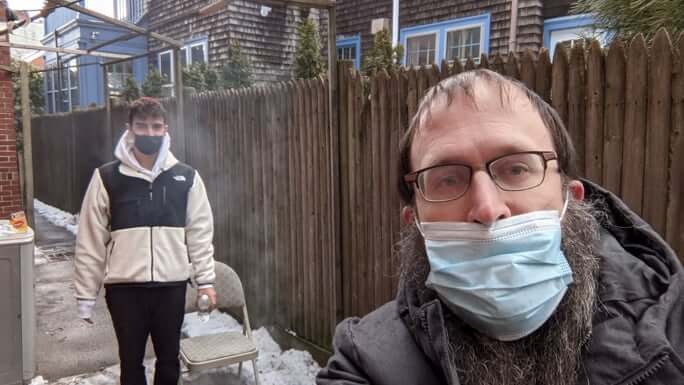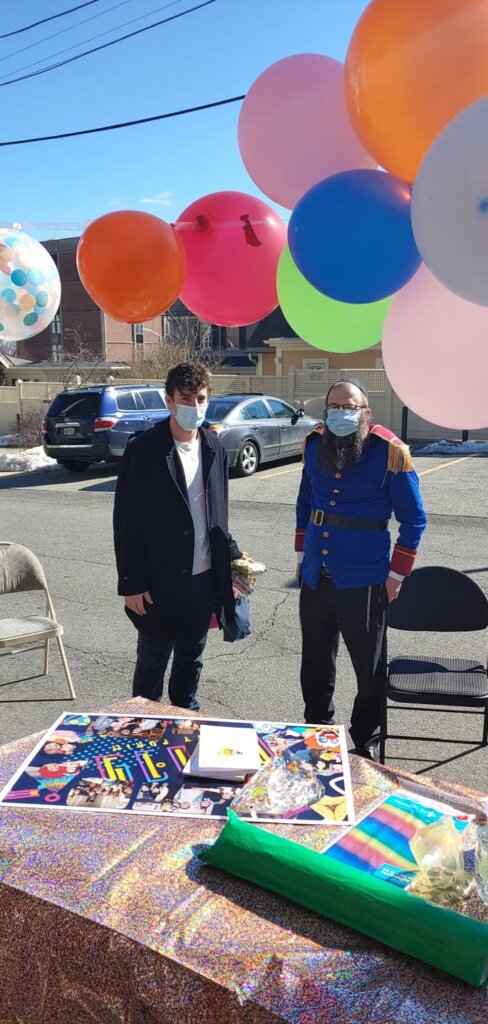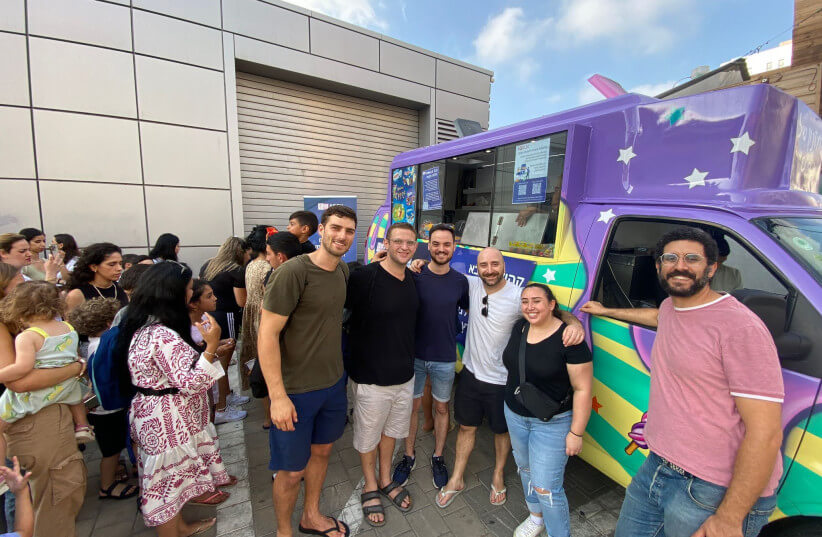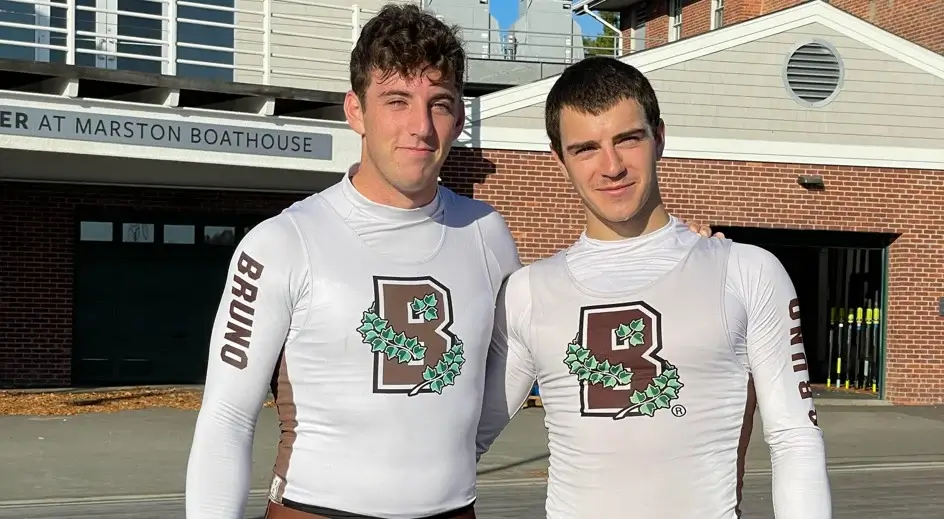Solidarity with Israel fits Alon Leichman like a glove
The original article is published at JPost.com
Blue-and-white baseball and softball players wear their support on their hands.
When Cincinnati Reds assistant pitching coach and former Team Israel Olympian Alon Leichman unveils his special Independence Day baseball glove next week, he will have a special group of unlikely supporters to thank.
Leichman, 34, the only native-born Israeli coaching in Major League Baseball, spent time in Israel from October 18, 2023 to February 1, 2024, where he picked oranges and avocados with Team Israel teammates, and received a great deal of support from the Reds and former teams and players, and contemplated ways he could continue to be supportive to his homeland.
When Leichman returned to the United States for Reds Spring Training, a picture on social media of a unique baseball glove caught his attention – and it would send him down the road to producing two unique mitts of his own which would contain powerful messages in support of Israel.
Leichman initially saw a photo of a two-toned blue softball glove, shared by Team Israel softball player Maddy Lewis. Her glove contained the word “Hazakim B’yachad” (“stronger together”). Her own glove story would inspire Leichman.
Lewis, 26, had a distinguished college softball career at the University of California San Diego, where she also worked in the athletics communication department. Lewis was longing to stay connected to softball after graduation. She tried out and made Israel’s national team and became an Israeli citizen in July 2023. Lewis is currently the social media and community manager for Blast Motion, a company that created a device that attaches to the knob of a baseball bat to monitor bat speed and rotation. To stay in shape for softball, she often trains on her own.

BASEBALL GLOVE designer Jake Hale (right) has been working with Cincinnati Reds assistant pitching coach Alon Leichman (left) and other Israeli athletes to create unique Israel-themed mitts (inset) in the aftermath of October 7 and the ensuing war. (credit: Jake Hale/Courtesy)
“I was running bases, hitting off a tee, and throwing against a wall at a park in San Diego when a friendly guy came up to me,” she told The Jerusalem Post.
The friendly man was Jake Hale, a self-described “old country boy from Ohio” who played minor league baseball for ten years without seeing a single day in the majors. Hale started a company called JH Performance, which includes a division that sells baseball equipment and accessories.
“I saw a girl there all the time working out,” noted Hale. “I spoke to her, and she told me she plays for Team Israel.”
Showing support through sports
Hale was trying to get into the softball glove market and offered to create a customized glove for Lewis, who immediately knew the color scheme she wanted but asked a friend to help her find a slogan to put on the glove to help remind her of the purpose and values after all that happened on October 7.
Lewis appreciated how careful Hale was in getting the Hebrew just right.
“Hebrew is right to left, which is confusing. He wanted it to be perfect!”
Fellow Team Israel softball player, Ruby Salzman, who played at West Texas A&M University, reports, was also inspired by Lewis.
“I asked, ‘what is one thing that means a lot?” recounted the self-reported “committed Jew.”
“It was cool having a glove with the Israel flag on it.”
She added the flag and the Star of David to the Hebrew word “Linshom,” (“breathe”) to her specially designed glove.
Hale is pleased with the way news of his gloves – and their messages – are spreading.
“I got Maddy her glove, she made a post, and Alon saw it.”
“When I saw it, I thought ‘maybe I should get a glove too’” said Leichman, who decided to design his own red and black glove which he notes are “the colors of Bring Them Home.”
Leichman also regularly sports a “Bring Them Home” shirt on the field while practicing with his Cincinnati teammates.
Leichman proudly noted that he has “two more gloves coming – a blue-and-white for Remembrance Day and Independence Day and a catcher’s glove.”
Hale proudly delivered the blue and white glove to Leichman when the Reds were in San Diego recently to play against the Padres.
As excited as he is about the initiative, Leichman added with concern and optimism: “I am hoping things get better back home and [wearing special gloves] won’t be a thing anymore.”
Brothers on Brown U. Rowing Team Champion Jewish Pride
The original article is published at chabad.org
Amid rising antisemitism on American college campuses, Swidler brothers unite in their faith
For Nathan and Asher Swidler, two brothers on the Brown University heavyweight rowing crew team, their strong and always evolving relationship with Chabad-Lubavitch began with the installation of a mezuzah on a cold day in Providence, R.I., in the middle of the pandemic.
Nathan (“Nate”), 23, and Asher (“Ash”), 22, are just 14 months apart in age and grew up in London to American parents. Having been raised with a strong sense of Jewish identity, upon completing high school, both boys spent a gap year in Israel.
Nate has been rowing since the age of 15, when he picked up the sport during his school days at Eton, a prestigious boarding school in England. When choosing which college to attend, he decided on Brown, as it is one of the top rowing teams in the country, while also being well known for its rigorous Ivy League education. Ash was a rare “walk on” to the crew team, which he joined during his junior year.
And Nate’s not just another rower. His memorable rowing moments include winning the Henley Royal Regatta in 2019, beating Harvard last year in the dual race and rowing in the pair competition with his brother.
Their family’s connection to Chabad goes back generations. The boys’ father, Josh, recalls his mother teaching in the Chabad yeshivah day school in Worcester, Mass., which was led for more than seven decades by Rabbi Hershel Fogelman. Though at the time the family identified as Reform, this connection eventually led them to keeping a kosher home.
Another link in the chain was added when the Swidler boys arrived on Brown’s campus in January 2021.
“We both knew we wanted mezuzahs on our doorpost,” Ash told Chabad.org.
Nate told a friend from London who was active in Chabad at Columbia University, who in turn reached out to Rabbi Mendel and Chana Laufer, co-directors of the Rohr Chabad House serving Brown University, Rhode Island School of Design (RISD) and Johnson & Wales University, all of them in Providence.

In 2021, the day after their mandatory “two-week quarantine” arrival period ended, the rabbi greeted the boys outside the dormitories with a warm smile and open arms. Credit: Chabad of College Hill
The First of Many Meetings
This was back in the Covid days, and the day after their mandatory “two-week quarantine” arrival period ended, the rabbi greeted the boys outside the dormitories with a warm smile and open arms—at the time, he was not allowed inside due to pandemic regulations—and handed them each a mezuzah, a homemade challah and cards with the Shema prayer.
The relationship between the two British expats and the Laufers grew as the weeks went on.
“Nate’s and my initial interaction with the rabbi swiftly led to weekly meetings,” Ash said. “We would sit outside in the freezing cold January winter for hours. For me, Rabbi Mendel’s conversations evoked an element of authenticity that I found to be lacking in conversations with hundreds of fellow students.”
Ash, who is the current student president of Chabad at Brown, proudly chronicles its growth since he started there.
“Today we have over a hundred students coming on a regular Friday night,” he said.
There is a kosher kitchen in the largest dining hall at Brown, and this year dozens of students affixed a mezuzah to their doorposts courtesy of Chabad.
Eventually, the boys committed to putting on tefillin regularly. Rabbi Laufer, sensing the opportunity for a meaningful birthday gift, reached out to Ash’s father, Josh, to organize Ash to receive his own pair for his 22nd birthday.
“Following the passing of my wife, Ash found significant meaning and comfort in Torah study, something I am both proud of and encouraged with my whole heart,” Josh Swidler explained. “If I can play even the smallest part in enhancing Jewish identity and meaning for my children, I will do it.”
Nate participates in weekly Sinai Scholars classes and has managed to attend Shabbat dinners nearly every week of his senior year. The Swidlers devotion to Chabad and Jewish life on campus is even more noteworthy considering the demands made on college athletes.

After resolving to put on tefillin regularly, Ash received a pair of his own from Rabbi Mendel Laufer for his 22nd birthday. Credit: Swidler family
Standing up for Israel at an Ivy League
In the wake of the Oct. 7 terrorist attacks and what they describe as the “worryingly hostile climate for Jews” across college campuses, the brothers knew they had to do something.
“We felt desperate to champion the cause in a way we knew how, to spread positivity both on and off the water,” said Nate. So they came up with an idea that would literally make the Jewish people’s connection to their ancient homeland “in fashion” on and around campus—and on the water.
Nate and Ash designed a unisuit with the Star of David on the front and “Am Yisrael Chai” written on the back. The outfit made it easy for fellow rowers and classmates to see their support for the Land of Israel and its people.
They assumed that the project would receive mixed support from the rowing team, so they polled each member individually to see if they would consider wearing the uni. “Thirty of fifty said they wanted one—it warmed our hearts!,” said Ash.
Brooke Verschleiser, a student at Brown, is proud of the Swidlers and their enthusiasm to wear their Jewish identity on their sleeves.
“Seeing Ash and Nate stand up for Israel in the midst of adversity on campus is truly inspiring,” she said. “Their fortitude in defending Israel … is a powerful example for other students to advocate for the truth and stand up for what they believe in.”
Ash credits a fair share of their initiative to Rabbi Laufer.
“Rabbi Laufer is the smartest guy I know,” he said. “He is a source of support and a builder, creating a home where even the university president feels comfortable and welcome.”
Ash and other students appreciate Brown President Christina Paxson’s support for Chabad, where she is a familiar face. Laufer notes that she was sharing Shabbat dinner at Chabad on the same day other Ivy League college presidents were testifying about antisemitism on campus in Washington, D.C.
Chabad at Brown likewise receives the highest compliments of Joshua Bolton, the executive director of Brown/RISD Hillel.
“There really is no example like Brown, where Hillel and Chabad are working as closely together on behalf of the Jewish future,” he said. “There’s a story I’ve heard about the Rebbe [Rabbi Menachem M. Schneerson, of righteous memory] hopping a fence. Mendel and Chani are the ultimate fence-hoppers. Nothing stands in their way. Nothing can prevent their holy work.”

The Swidlers devotion to Chabad and Jewish life on campus is even more noteworthy considering the demands made on college athletes. Credit: Chabad of College Hill
Meet the Oleh rabbi making a difference for families in Tel Aviv
The original article is published at JPost.com
The London-born Rabbi Joe Wolfson has a reputation for quickly becoming an active and important force in whichever city in the world he chooses to call home.
Rabbi Joe Wolfson loves cities and has spent large chunks of time in London, New York, and Tel Aviv.
Fortunately for many people in Israel – especially in the days and weeks after Oct. 7 – the energetic, likable, and very resourceful 38-year-old, along with his wife, Corinne, and children, Mika, eight, Tal, six, and Barak, one, has chosen to make Tel Aviv their home since making aliyah.
The London-born Wolfson has a reputation for quickly becoming an active and important force in whichever city in the world he chooses to call home. He arrives, observes the scene, assesses communal needs, recruits partners, and works tirelessly to serve those in need.
Wolfson’s “official” jobs in Israel include serving as director of the Amital Center for Jewish Study and Leadership at Har Etzion; and working as co-director (with Corinne) and rabbi of JLIC TLV, a community of young olim in their 20s and 30s.
JLIC, short for Jewish Learning Initiative on Campus, is an affiliate of the Orthodox Union and primarily serves students on American college campuses. In recent years, JLIC has expanded its activities to serve university students on Israeli campuses, as well as young adults in Jerusalem and Tel Aviv.

RABBI JOE and the JLIC TLV community members bring an ice cream truck to evacuees in Tel Aviv hotels. (credit: Karen-Lynn Lang)
Rabbi Joe and Corinne serve as a community rabbinic team, opening their home for Shabbat meals, study (in their home, and with upwards of 60 people at a local synagogue on Monday nights), and general support of recent olim. Rabbi Joe also records drashot (Torah teaching videos) while riding his bike.
The Wolfsons’ unofficial roles extend well beyond serving the needs of young English-speaking olim.
During Operation Swords of Iron, the vibrant JLIC TLV community has mobilized and become involved in many aspects of the emergency response effort.
Since Oct. 7, the Wolfsons have raised over $300,000 to provide accommodations, food, and childcare for 300+ families in Tel Aviv. They organized large events such as an ice cream truck for 800 evacuated children, launched a Family Match Program (to match displaced families with individuals from the JLIC community), and coordinated a Job Placement Program to help displaced people find temporary work. This is in addition to the meals, clothing, and medical supplies the team delivers for soldiers weekly throughout Israel.
“I feel privileged to lead a young community. I see my role as a shadchan [connector] of people who want to help and those who need the help,” he says.
In many ways, the Wolfsons’ previous stint – as an OU-JLIC rabbinic couple at New York University’s Bronfman Center for Jewish Life in New York (2015-2022) – helped them develop the tools and grit they would need in their work in Tel Aviv.
“We were fascinated and in love with Lower Manhattan – we fell for New York hook, line, and sinker,” reports Wolfson. “We loved everything – the energy, glamour, grime, hustle, swagger, and the history.”
They also quickly began to serve the community. “I really believe in neighborhoods and cities,” Wolfson says. “There is something ethically important about cities; being close to neighbors and having different sorts of neighbors are important.”
Wolfson got to know his downtown Manhattan neighborhood, including its rich history. “I have an entire bookshelf dedicated to the Lower East Side,” he says. Wolfson began offering tours, such as Gangsters & Gedolim tours, and the Jewish Eats culinary-social experience.
He also got to know the needs of the community. “We did lots of hessed [acts of kindness]. We learned in New York how to mobilize young Jewish people to be involved and attentive to the needs of others.”
They initially focused on the homeless. “At Purim time, we used matanot l’evyonim [giving gifts to the poor] as the central entry point.” He describes people giving money for materials which were used to buy things for people at the Bowery Mission, a program providing meals, shelter, and residential programs for people experiencing homelessness.
The commitment of the JLIC community at NYU to the neighborhood extended to those impacted by COVID. On short notice, community members kashered for Passover the Jacob Javitz Center, which was being used as a field hospital. They distributed thousands of meals to those in need and facilitated the vaccination of over 800 people in the early days of the vaccine roll-out.
The Wolfsons’ focus on helping others was part of their larger goal. “We aspired to create a community in and of downtown Manhattan – to endow people with a sense of place and significance. We were trying to be a bit counter-cultural and disruptive – to create a model to power the Jewish future.”
They strongly believe in the Jewish concept of mitzvah goreret mitzvah – one good deed leads to another. Wolfson was recognized as one of the New York Jewish Week’s “36 Under 36” in 2020 for his COVID relief work.
Making Aliyah
AFTER SEVEN years in New York – with the kids getting older – the Wolfsons realized it was “time for our next challenge.” They knew it was time to return to Israel, where Rabbi Joe and Corinne had strong connections and had spent significant time.
Wolfson, who was active in Bnei Akiva while growing up in London before studying political philosophy at the University of Cambridge and receiving a master’s degree at University College London, studied at Yeshivat Har Etzion and Beit Morasha. He also received smicha from Israel’s Chief Rabbinate.
Corinne grew up in Leicester, studied art history at the University of Leeds and at the Courtauld Institute of Art, studied at Nishmat and Matan, and trained as a chef at Tadmor in Herzliya. She has worked in various restaurants in Israel. Her family’s ties to Israel run very deep: Her mother volunteered in Israel in 1967, made aliyah in 1968, and married a man whose family had been living in Tel Aviv since the 1920s.
Prior to the current war, Wolfson was experiencing what so many Israelis were also experiencing. “It was a profoundly alienating year for olim – watching Israeli society tearing itself apart was hard.” Through his nonstop work with and for the community, he no longer feels alienated. “That has changed. This is our place!”
Despite Wolfson’s frenetic pace doing so much for so many, he is able to step back and reflect on his family’s aliyah experience. He acknowledges the difficulties: “People are stressed and can be quick to get angry on the streets – and the lack of Sundays can be hard.” He also notes that, as opposed to the Diaspora, “people make assumptions about your political views based on [your] wearing a kippah.”
Wolfson was pleased to find that the bureaucracy of making aliyah “was fine” and “has improved.” He is happy to report that his children have adjusted well to life in Israel, though he notes, “The war has been hard,” especially for older children who are able to read the writing on the hostage posters and can articulate fears of being kidnapped.
Wolfson notes that making aliyah for 20- and 30-somethings can present particular challenges, given that people may have no family in Israel and may not have served in the army or have the support networks that other Israelis do.
He encourages olim to “find a good community – people who can support you and [with whom] you can grow together. A good community is essential.”
The Wolfsons are there to help! ■
Rabbi Joe Wolfson, 38From Manhattan to Tel Aviv, 2022



